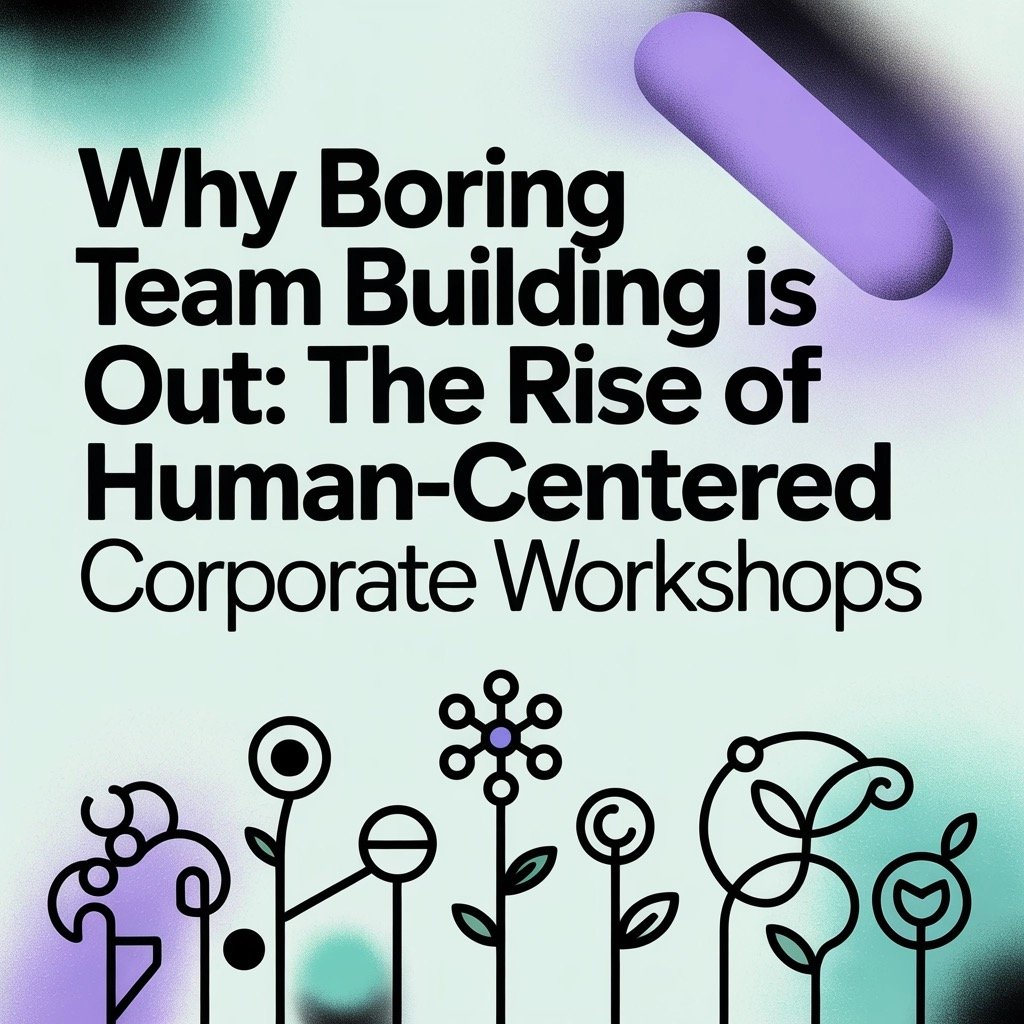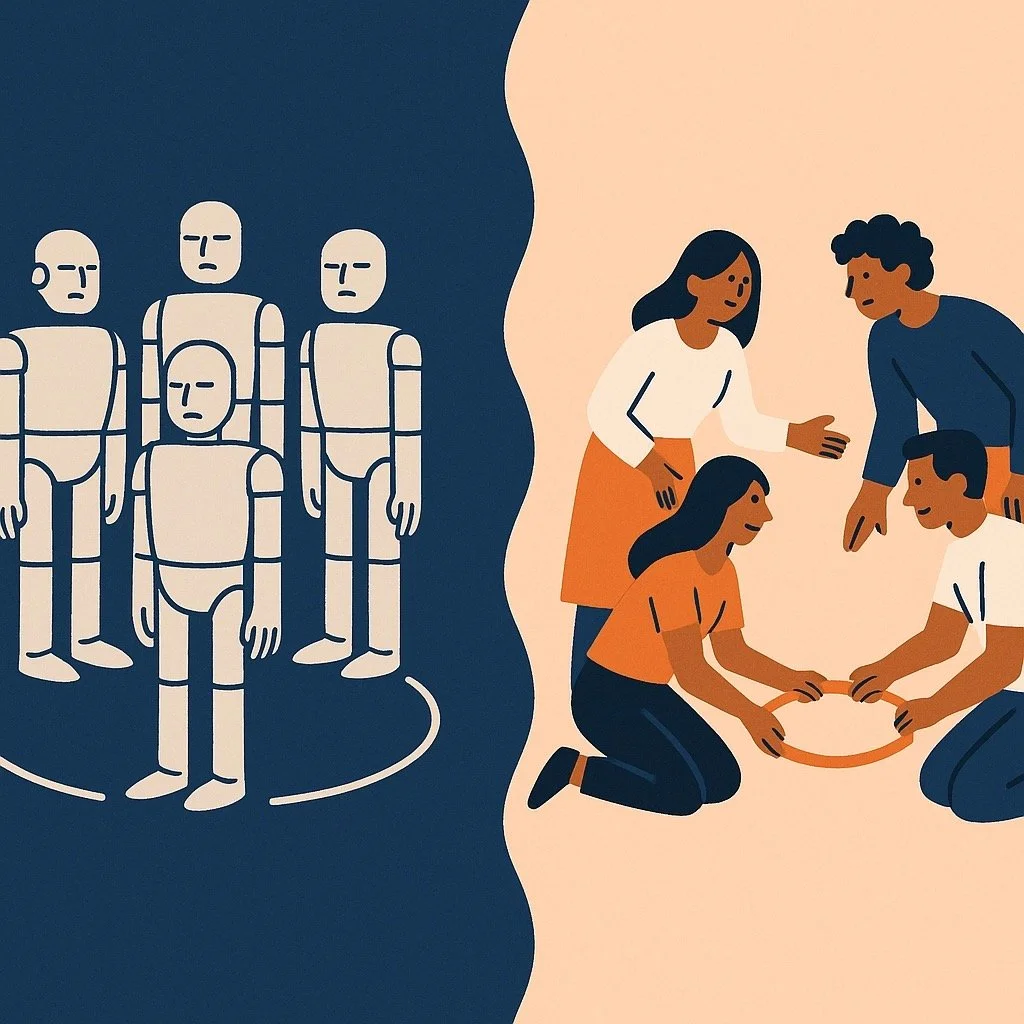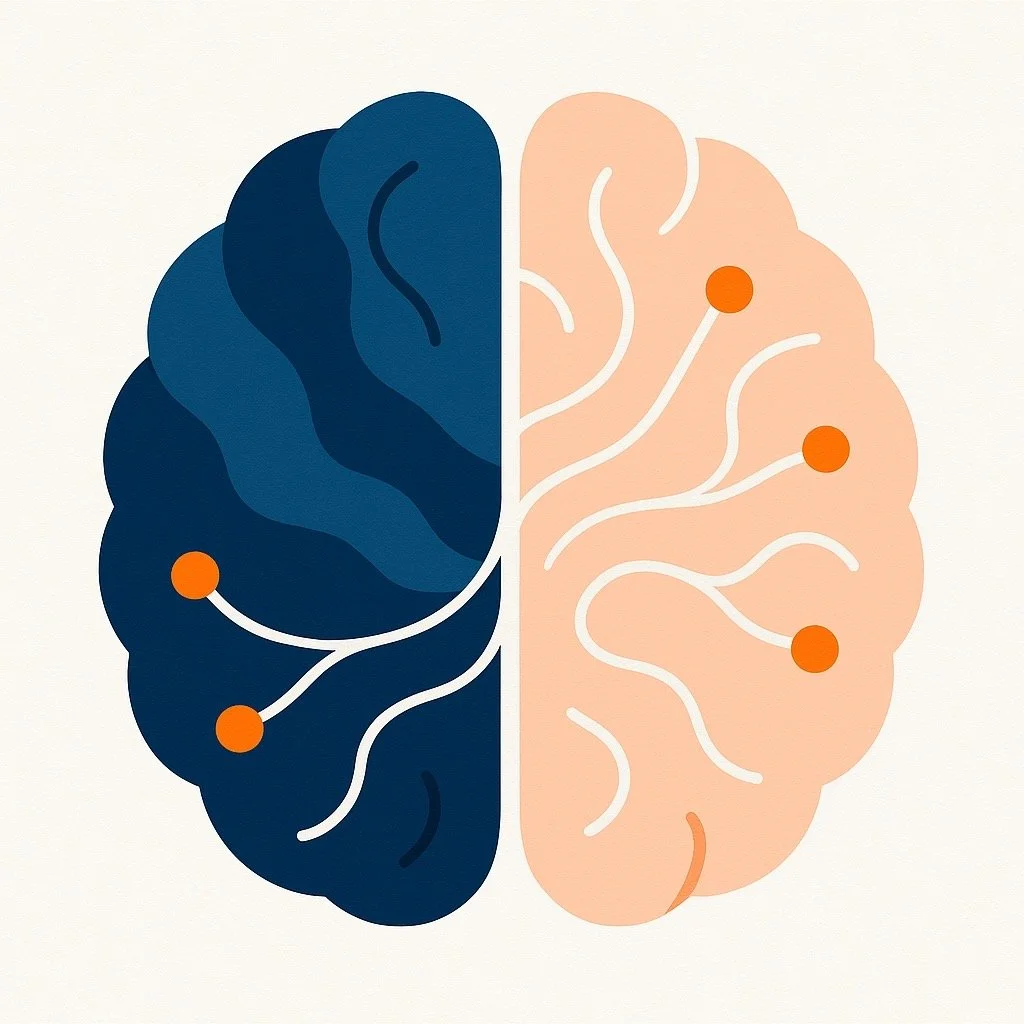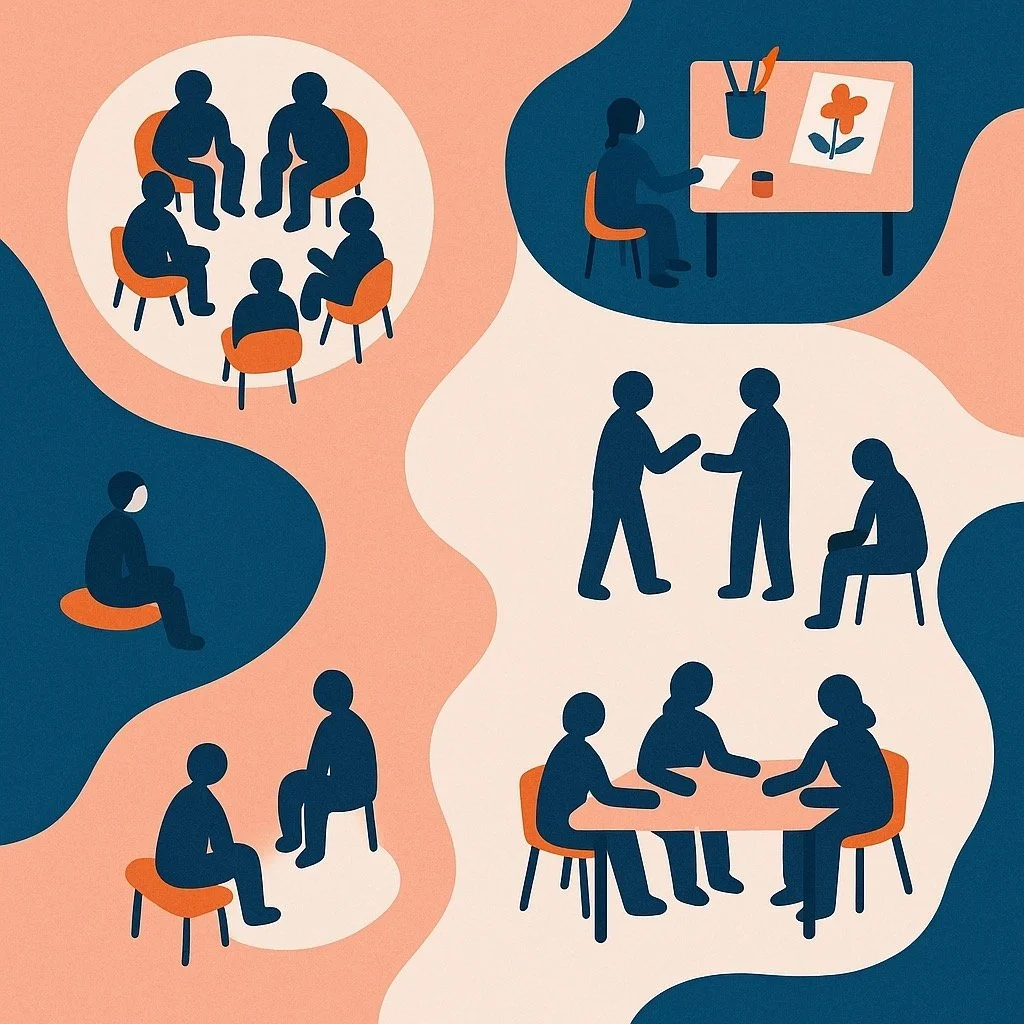Why Boring Team Building Is Out: The Rise of Human-Centered Corporate Workshops
The Death of Eye-Rolling Team Building
Let's be honest—we've all been there. You receive that calendar invite with "Mandatory Team Building" in the subject line, and your soul leaves your body a little. You're immediately transported back to memories of forced trust falls, awkward icebreakers, and activities so disconnected from your actual work that they might as well be taking place on Mars.
The good news? Those days are rapidly becoming extinct.
In 2025, we're witnessing the well-deserved death of boring, cookie-cutter team building activities that treated employees like robots who just needed to be programmed for "synergy." Instead, a new approach has taken center stage: human-centered workshops that recognize employees as, well, actual humans.
Why Traditional Team Building Failed Us
Traditional team building activities often missed the mark because they:
Focused on surface-level interactions rather than meaningful connections
Treated everyone the same, ignoring diverse personalities and work styles
Were disconnected from real workplace challenges
Prioritized forced fun over genuine engagement
Measured success by how many people showed up, not by actual impact
One survey found that 31% of employees consider team building activities "a waste of time," while another 36% participate only because they feel obligated. When a third of your workforce is mentally checking out before an activity even begins, you've got a problem.
The Human-Centered Revolution
Human-centered workshops flip the script by starting with a radical concept: remembering that employees are people first, workers second. Rather than trying to force connection through artificial activities, these workshops create environments where authentic relationships can develop naturally while building genuinely useful skills.
As our workplace landscape has evolved—especially after years of remote work, global challenges, and shifting priorities—employees crave experiences that respect their humanity, acknowledge their challenges, and provide meaningful growth opportunities.
What Makes a Workshop Human-Centered?
Psychological safety comes first
Creating environments where people feel safe to be themselves, make mistakes, and express honest opinions is non-negotiable. Without this foundation, no amount of activity planning matters.Skills with immediate application
Unlike theoretical exercises, human-centered workshops teach skills participants can use the very next day. The connection between the workshop and real work is clear and compelling.Personalization at every level
From accommodating different learning styles to addressing specific team challenges, these workshops reject one-size-fits-all approaches in favor of tailored experiences.Meaningful metrics beyond satisfaction
Success isn't measured by smiles and high-fives alone, but by lasting behavior changes, skill development, and improved team dynamics that continue long after the workshop ends.
The Neuroscience Behind Better Workshops
The rise of human-centered workshops isn't just about making people feel good—it's backed by solid science. When people feel psychologically safe and personally invested, their brains release neurochemicals that enhance learning, memory formation, and positive association.
Conversely, when people feel forced into uncomfortable situations or see no relevance to their work, their brains trigger stress responses that literally prevent learning and connection—exactly what traditional team building often inadvertently caused.
Four Pillars of Effective Human-Centered Workshops
1. Authentic Connection Over Forced Interaction
Human-centered workshops prioritize creating conditions where genuine connections can form organically. Rather than forcing extroverted behavior from everyone, these workshops provide multiple pathways for engagement that respect different personality types and communication preferences.
"We've completely abandoned the notion that everyone needs to participate in the same way," says Maya Jensen, Learning Director at Telstra. "Some team members thrive in active discussion, others prefer written reflection, and some contribute best in smaller groups. When we honor these differences, the quality of engagement skyrockets."
2. Skills That Matter in 2025 and Beyond
Modern workshops focus on building what we at Chatterbox Workshops call "forever skills"—capabilities that remain valuable regardless of how technology evolves. These include:
Adaptive communication across diverse teams
Creative problem-solving under constraints
Emotional intelligence and empathy
Collaborative decision-making
Resilience during uncertainty and change
A recent study on top soft skills for 2025 found that these human capabilities are becoming more valuable, not less, even as AI and automation reshape our workplaces.
3. Blending Digital and Physical Experiences
Human-centered doesn't mean anti-technology. The most effective workshops thoughtfully integrate digital tools to enhance human connection rather than replace it.
For example, our gamified learning experiences use technology to create immersive scenarios where teams solve problems together, combining the engagement of digital interfaces with the irreplaceable value of face-to-face collaboration.
4. Wellbeing as a Foundation, Not an Afterthought
In 2025, employee wellbeing isn't a nice-to-have—it's essential infrastructure. Human-centered workshops acknowledge that people can't learn, connect, or perform at their best when they're burned out, stressed, or disengaged.
"We've found that even a brief focus on mindfulness or stress management at the beginning of a workshop dramatically improves participation and information retention," notes Dr. Alisha Patel, organizational psychologist. "It signals to participants that their wellbeing matters, which immediately builds trust."
Real Results: Beyond the Workshop High
The true test of any workshop is what happens after everyone returns to their desks. Human-centered approaches show measurable improvements in:
Team communication efficiency: 42% reduction in miscommunication-related delays
Employee retention: Organizations with human-centered learning programs see 34% lower turnover
Innovation metrics: Teams report 27% more implemented ideas following collaborative workshops
Conflict resolution: 39% faster resolution of team disagreements
As our research on employee wellbeing and retention shows, these workshops create ripple effects that benefit the entire organization.
Implementing Human-Centered Workshops: Where to Start
If you're ready to leave boring team building behind and embrace the human-centered approach, here's your roadmap:
Start with listening
Before planning any workshop, survey your team about their actual challenges, learning preferences, and goals. Use this data to drive your workshop design, not the other way around.Create psychological safety first
No workshop activity will succeed without psychological safety. Establish clear ground rules, model vulnerability as a leader, and create multiple ways for people to participate.Connect to real work
Every element of your workshop should have a clear connection to participants' actual responsibilities. Make these connections explicit, not assumed.Build in application and follow-up
Learning doesn't end when the workshop does. Create structures for practicing new skills, buddy systems for accountability, and follow-up sessions to reinforce learning.Measure what matters
Look beyond satisfaction surveys to measure real behavior change, skill application, and business outcomes connected to your workshop goals.
The Future Is Human
As we look ahead, the distinction between "work skills" and "human skills" continues to blur. In a world where AI handles more routine tasks, our uniquely human capabilities—creativity, empathy, collaboration, and adaptability—become our most valuable professional assets.
Human-centered workshops aren't just more enjoyable than their boring predecessors; they're strategically essential for organizations that want to thrive in rapidly changing environments. By investing in workshops that honor employees' humanity while building critical skills, companies create resilient teams ready to navigate whatever comes next.
The days of eye-rolling at the mention of team building are ending. In their place, we're seeing the rise of learning experiences that people actually want to attend—because they recognize themselves in the design, see the relevance to their work, and experience real growth as both professionals and humans.
And that's a calendar invite worth accepting.
Looking to transform your team's development approach? Chatterbox Workshops specializes in human-centered learning experiences that build lasting skills while respecting the whole person. Explore our insights or contact us to design a workshop that your team will actually thank you for.




